“I know it was. But — I’m your mother.”
“I’d do it for you too. Mother, I would.”
“I believe you would. But I hope...” Mrs. Blount let it hang. She turned. “Mr. Goodwin, it seems to be your lot to hear our intimate affairs. That evening I didn’t shake hands with you because I wouldn’t mean it, but I would now.” She extended a hand. “If you would.”
I moved to take the hand. It was small and firm, and cold “There’s no longer a difference of opinion,” I said “Why not sit down?”
Sally had sat, and where, do you suppose? In the red leather chair. As I moved up one of the yellow ones for her mother I was thinking that jealousy wasn’t enough, it was more complicated than that, but Mrs. Blount was speaking. “May I see Nero Wolfe? If he’s not too busy?”
I said I’d see, and went. In the kitchen Wolfe was on the stool at the big table, drinking beer and watching Fritz peel shallots. He gave me a frown and asked, “They’re bickering?”
“No, sir. They’re both sorry, but Sally copped the red leather chair. Mrs. Blount wants to see you if you’re not too busy. She shook hands with me, so be prepared for physical contact with a woman.”
Nothing doing. He said something to Fritz, left the stool, picked up the glass with one hand and the bottle with the other, proceeded to the office and on in, stopped three paces short of the yellow chair, said, “I’m Nero Wolfe, Mrs. Blount,” bowed from the waist like an ambassador or a butler, went to his desk, put the glass and bottle down, sat, and asked Sally, “Should you be up? Dr. Vollmer said you need rest and quiet.”
“I’m all right,” she said. She didn’t look it.
He turned to the mother. “You wanted me?”
She nodded. “Yes. My husband does. He wants you to come — he wants to see you. Today.”
Wolfe grunted. “You have spoken with him?”
“No, but Mr. McKinney has. He’s the senior partner in the law firm. He saw him this morning. My husband told him that he wouldn’t — oh. Perhaps you don’t know. Did Mr. Kalmus tell you, before he — did he tell you yesterday that my husband had written to you to engage your services?”
“No.”
“He told me, on the phone yesterday afternoon. He said—”
“What time did he phone you?”
“About six o’clock. A little before six.”
“Where did he phone from?”
“I don’t know. He said he had told my husband that he thought you should be engaged to investigate something, and my husband had written to you. Then this morning—”
“Did Mr. Kalmus say what I was to investigate?”
“He didn’t say what , just that it was something only he and my husband knew about. Then this morning Mr. McKinney went to see my husband, and—” She stopped, and smiled. It wasn’t actually a smile, just a little twist of her lips that it took good eyes to see. “It isn’t natural for me,” she said, “saying ‘my husband, my husband.’ Since you’re going to... I call him Matt. If I may?”
“As you please, madam.”
“This morning Mr. McKinney went to see him, to tell him about Dan — Mr. Kalmus, and he said he wants to see you. He wouldn’t tell Mr. McKinney what you are to investigate. Mr. McKinney is getting a permit for you from the District Attorney. He wanted to phone you, to ask you to come to see him, but I told him I would rather come to you. I... I insisted.”
She didn’t look like an insister or sound like one, but toughness is as toughness does, and there she was, no red in her eyes and no sag to her jaw, only a few hours after she had heard about Kalmus. But she wasn’t cold, though her hand had been; you couldn’t possibly look at her and call her cold.
Wolfe had his arms folded. “The permit will have to be for Mr. Goodwin,” he said, “since I leave my house only on personal errands. But I need—”
“Matt told Mr. McKinney that he must see you.”
“Outside this house Mr. Goodwin is me, in effect — if not my alter ego, my vicar. But I need some information from you. I presume it’s your opinion that your husband did not kill Paul Jerin.”
“Not my opinion. Of course he didn’t.”
“Have you considered the alternatives?”
“Why... yes. Yes, I have.”
“Eliminating the two men in the kitchen, the cook and the steward, and on that I accept the conclusion of the police and the District Attorney, one of four men must have put the arsenic in the chocolate. The four messengers. You realize that?”
“Yes.”
“That’s manifest. But what was the motive? None of them had had any connection or association with Jerin. Therefore I concluded that the purpose was to injure your husband — indeed, to destroy him — and that purpose had apparently been attained. Yesterday my attention was centered on Mr. Kalmus as the most likely of the four. His objective was you. He wanted you, and your husband was in the way. When Mr. Goodwin—”
“That’s absurd, Mr. Wolfe. Absurd .”
He shook his head. “It still isn’t absurd, now that I’ve seen you. For any man vulnerable to the lure of a woman, and most men are, you would be a singular temptation. Kalmus’s death by violence has made the assumption of his guilt untenable, but it hasn’t rendered it absurd. Now we have the other three — Hausman, Yerkes, and Farrow, your nephew. By the only acceptable hypothesis left to us, one of them killed both Jerin and Kalmus — Jerin to injure your husband, and Kalmus because he knew or suspected the truth and threatened exposure. When Mr. Goodwin sees your husband he may learn what it is that Kalmus knew, but you are here and I have questions for you; and if you hope to see your husband cleared you will answer with complete candor. Which of those three men had reason to destroy your husband?”
Her eyes were meeting his, straight. “None of them,” she said. “Or if they did... no. It’s impossible.”
“Nothing is impossible in the relations between men and women. Your nephew, Morton Farrow. It has been suggested that he calculated that with your husband gone, through you he would be able to take control of the corporation. Is that impossible?”
“It certainly is. I wouldn’t give my nephew control of anything whatever, and he knows it.” Again the little twist of her lips. “He came to see you, didn’t he?”
“Yes.”
“Well?”
Wolfe nodded. “Quite. But it’s still possible that he miscalculated. Mr. Hausman?”
She made a little gesture. “Ernst Hausman is Matt’s oldest friend. He is our daughter’s godfather. He would do anything for Matt, anything. I’m absolutely sure.”
“He’s a dotard. Just short of demented. He came Monday evening to propose a scheme to extricate your husband unequaled, in my experience, for folly and fatuity. Either he’s unhinged or he’s exceptionally crafty, and if the latter you have been hoodwinked. Mr. Yerkes?”
She shook her head. “No.”
“Your daughter got him to come here, and he told me himself of dissension with your husband. He wants to be president of his bank, and your husband favors another candidate.”
She nodded. “I know. Matt has told me. Mr. Yerkes knows why, and he doesn’t resent it. It hasn’t affected their friendship.”
“Pfui. Are they paragons? But granting that, even a paragon is still a man. If it wasn’t absurd to suppose that Mr. Kalmus coveted you, what about Mr. Yerkes? He has seen much of you, hasn’t he?”
For five seconds I thought she wasn’t going to reply. She sat stiff, her eyes level at him. Then she said, “Must you go out of your way to be offensive, Mr. Wolfe?”
“Nonsense,” he snapped. “Offensive to whom? I suggest that you have a person and a personality capable of arousing desire; should that offend you? I suggest that Mr. Yerkes is not blind and has sensibility; should that offend him? We are not tittle-tattling, madam; we are considering your husband’s fate. I asked for candor. How does Mr. Yerkes feel toward you?”
Читать дальше

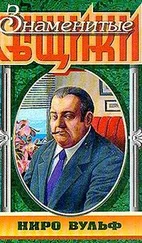
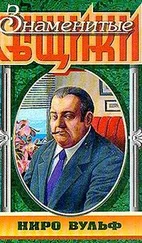

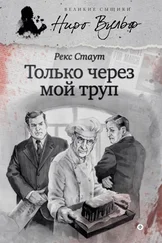

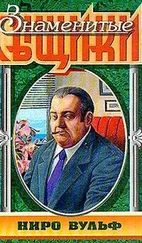
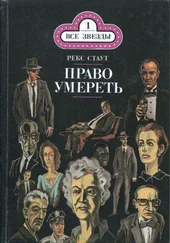
![Рекс Стаут - Лига перепуганных мужчин [litres]](/books/394342/reks-staut-liga-perepugannyh-muzhchin-litres-thumb.webp)